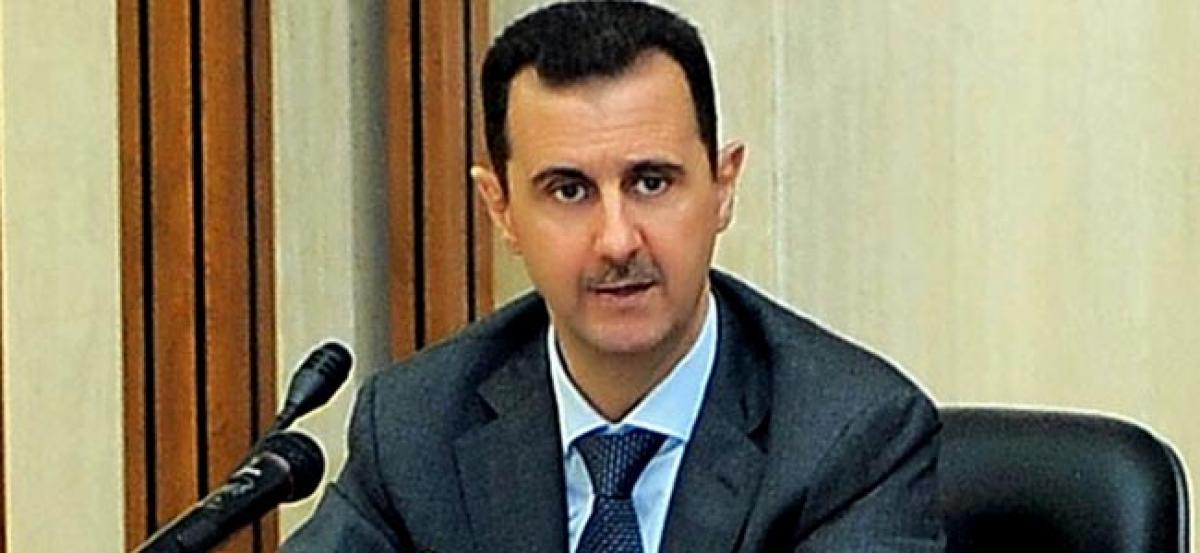Live
- Horoscope for November 28: Decoding Cosmic Clues for All Zodiac Signs
- Aishwarya Rai Bachchan’s Sister-in-Law Shrima Rai Shares Cryptic Post After Taking a Dig at Her
- Karnataka: Congress ministers indulge in lobbying ahead of Cabinet reshuffle
- Sujata joins duty after Odisha govt rejects leave extension
- Tur, urad prices have fallen in last 3 months: Govt
- NASA Alert: 130-ft Asteroid 2024 WQ2 Racing Past Earth at Over 62,000 km/h – Should We Be Concerned?
- What is UNSC Resolution 1701 and How it Relates to the Israel-Lebanon Ceasefire
- CM Mohan Majhi reviews preparedness at BJP state office ahead of PM Modi's visit
- Foods that boost the brain and sharpen memory
- Lisandro Martinez available for selection against Bodo/Glimt confirms Amorim
Just In

Syrian President Bashar al-Assad defended President Donald Trump\'s ban on Syrians entering the US, saying it targeted \"terrorists\" and not the Syrian people, in an interview broadcast Thursday.
Paris: Syrian President Bashar al-Assad defended President Donald Trump's ban on Syrians entering the US, saying it targeted "terrorists" and not the Syrian people, in an interview broadcast Thursday.
In January, Trump summarily denied entry to all refugees for 120 days and barred Syrian refugees indefinitely. The highly controversial decree, which was suspended by a federal judge, also barred travellers from seven predominantly Muslim countries, including Syria, for 90 days.
In an interview with French media Assad expressed understanding for the ban. "It's not against the Syrian people... it's against the terrorists that could infiltrate some of the immigrants to the West and that happened. It happened in Europe, mainly in Germany and could happen in the United States," he told Europe 1 radio and TF1 television channels in the interview in Damascus.
"For me, as president, I would not worry about that," he said, accusing Trump's critics of seizing on the ban ‘as the fuel for the conflict with Trump’.
The interview came as Syrian government representatives and rebel groups began new peace talks in the Kazakh capital Astana, brokered by Russia, Turkey and Iran.
The talks aim to shore up a faltering six-week truce and pave the way for new UN-brokered talks on a political solution to the six-year conflict.
Assad revealed that retaking the Islamic State's Syrian bastion of Raqa -- a key objective of the US-led coalition battling the jihadists -- was not a priority for his forces.
"Raqa is a symbol," he said, "You have ISIS close to Damascus, you have them everywhere," Assad said, using another acronym for IS.
"For us it is all the same, Raqa, Palmyra, Idlib, it's all the same," vowing to win back "every inch" of Syrian territory.
The French particularly have been pushing for an operation to flush IS out of Raqa, as the suspected incubator of some of the attacks that have claimed 238 lives in France over the past two years.
Across the border, Iraqi forces are four months into a massive operation to drive IS out of the city of Mosul. In Syria, an Arab-Kurd rebel alliance has begun advancing on Raqa with the aim of liberating the city.
In the interview, Assad again denied recent allegations by Amnesty International of executions and atrocities perpetrated at a prison near Damascus.
Assad said Amnesty's ‘biased’ report contained ‘not a single fact (or) evidence’ to support allegations that some 13,000 people were hanged at the Saydnaya prison between 2011 and 2015.
On the use of torture, he said, "We don't do this, it's not our policy," adding: "Torture for what?...For sadism?...to get information? We have all the information."
He argued: "If we commit such atrocities it's going to play into the hands of the terrorists, they're going to win. It's about winning the hearts of the Syrian people, if we commit such atrocities... we wouldn't have (popular) support (through) six years" of war.
He was also scathing of the West's fruitless attempts to mediate in the six-year conflict that has claimed more than 300,000 lives.
The West, he said, ‘did not want to achieve peace in Syria’. Over the past year, Russia and Iran have helped turn the tables in Assad's favour with their military backing, while Turkey supports rebels fighting to oust the strongman.
The talks in Astana are viewed as a warm-up for UN-led negotiations that are due to begin in Geneva on February 23.

© 2024 Hyderabad Media House Limited/The Hans India. All rights reserved. Powered by hocalwire.com







